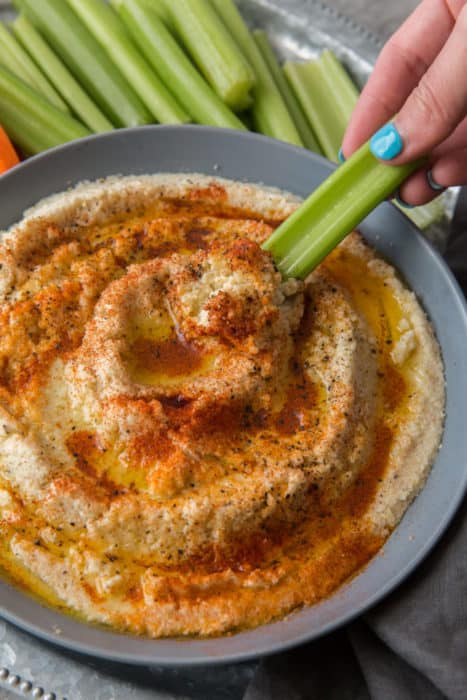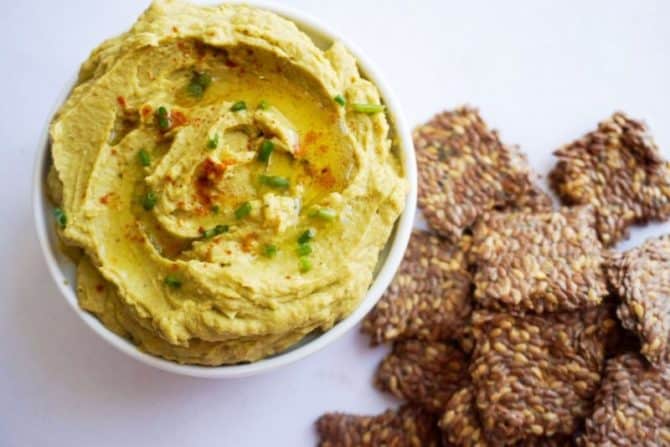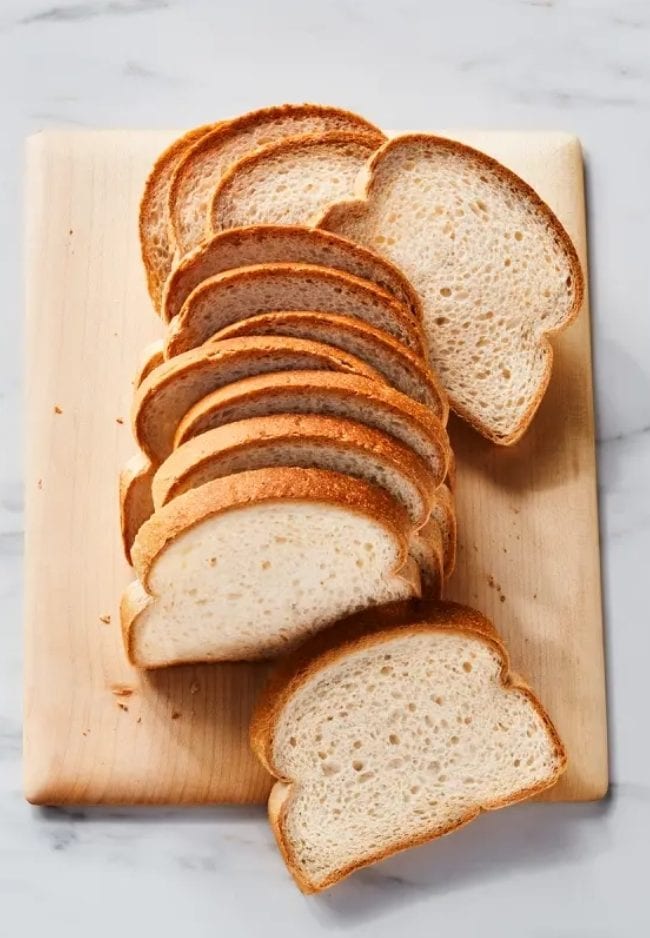The creamy texture and yumminess of hummus make it a worldwide favorite. I’m a big fan of dipping celery sticks and chicken bites in it since it’s tasty and keeps me full throughout the day.
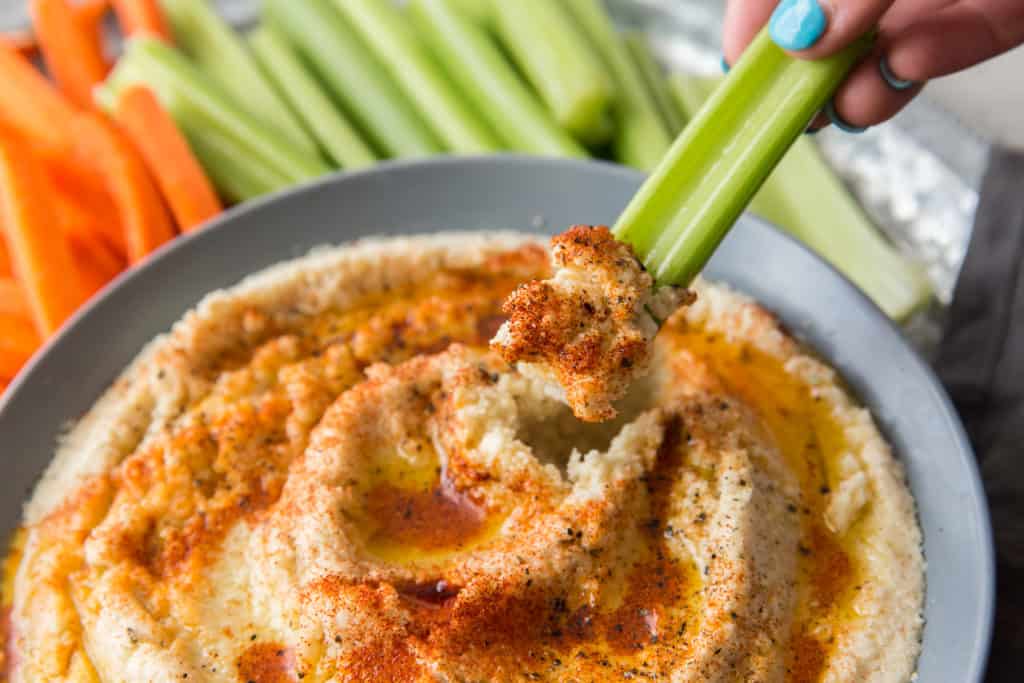
But can you eat hummus while staying in ketosis?
Below, we’ll talk about everything you need to know when eating hummus on keto. We’ll look at its carb content and some delicious recipes and alternatives.
Is Hummus Keto-Friendly?
Most store-bought hummus is keto-friendly because a two-tablespoon serving only contains four grams of net carbs. So feel free to use hummus when snacking since you can enjoy several tablespoons before it starts interfering with ketosis.
KetoConnect verdict: We give hummus a keto-friendly rating of ⭐⭐⭐⭐(out of 5)
But it’s important to read the label before buying. Many companies add soy oil, unnecessary preservatives and sweeteners that may inhibit ketosis and can trigger gluten intolerance symptoms in some people.
Luckily, if you make hummus at home with keto ingredients, you can reduce carbs to almost zero.
How Many Carbs Are In Hummus?
The amount of carbs in hummus depends on the brand you’re buying. Low-quality hummus that uses sweeteners can contain over six grams of carbs per serving.
But if you prepare your hummus at home with keto-friendly ingredients, the net carb count will hover around three to four grams.
How To Make Keto Hummus
Low-carb hummus is the perfect dip for keto dieters because it’s healthy and delicious. Whether you’re having friends and family over for dinner or you’re just looking to dip your snacks in a yummy sauce, hummus is for you.
So instead of buying hummus with added vegetable oil and corn syrup, consider these homemade recipes:
- Keto cauliflower hummus
- Avocado hummus
Keto Cauliflower Hummus
Grabbing some hummus from the store is convenient, but I feel like whipping up this cauliflower hummus recipe is just as easy.
It also helps that you have complete control over the ingredients that go into your homemade hummus. Knowing that you’re feeding your family with nutritious and keto-friendly products gives you peace of mind.
This recipe requires:
- Three cups of raw cauliflower florets
- Four cloves of garlic
- ¼ cup of avocado or olive oil
- ¼ cup of lemon juice
- ¼ cup tahini
- ¼ cup of warm water
- ¾ teaspoon of Italian seasoning
- ½ teaspoon of pink Himalayan salt
- ½ teaspoon of ground cumin
- ¼ teaspoon of black pepper
- Paprika and olive oil to garnish
You’ll also need a food processor to ensure everything is well-mixed.
Start by preheating your oven to 400 degrees Fahrenheit. Cut your cauliflower in half and remove the florets from the stem. Toss these florets and garlic cloves into a large baking tray and drizzle one tablespoon of avocado oil to prevent it from sticking. Place the baking tray in the oven for around 15 minutes.
Combine this roasted cauliflower and garlic mixture with lemon juice, tahini, water and seasonings and pop them in a food processor. Once it’s ground, add a few tablespoons of water and process until it has the desired consistency.
Since this recipe uses natural ingredients, we recommend you keep it refrigerated and consume it within a week as its shelf life is much shorter than processed store-bought hummus.
Avocado Hummus
Avocado hummus contains four grams of net carbs per serving and has ample amounts of fat. It goes especially well with keto pita bread and roasted veggies.
Preparing avocado hummus takes less than 15 minutes, and this recipe produces 22 servings. You’ll need:
- A 15-ounce can of garbanzo beans
- One large avocado
- Four cloves of garlic
- One tablespoon of olive oil
- The juice of a lime
- One teaspoon of cumin
- One teaspoon of pink Himalayan salt
- ½ teaspoon of paprika
- ½ teaspoon of cayenne pepper
- ½ teaspoon of pepper
All you have to do is pop your ingredients in a food processor, blend until everything is well combined and dig in!
Hummus Nutrition
One serving (two tablespoons) of homemade hummus contains:
- Three grams of carbs
- 50 calories
- 2.5 grams of protein
- 2.6 grams of healthy fats
- One gram of fiber
What stood out to me was the high protein content. One serving provides you with 2.5 grams of protein. Although plant protein isn’t as bioavailable as animal protein, it’ll keep those dreaded hunger pangs at bay.
This high protein content is handy for athletes. Without adding extra meals to your diet, you can increase protein intake.
Hummus is also nutrient-dense, consisting of nutrients like:
- Potassium
- Sodium
- Iron
- Vitamin E
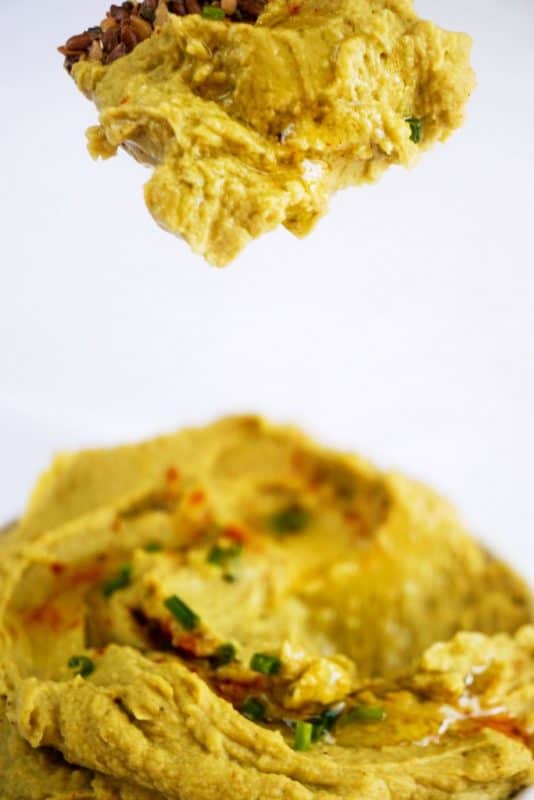
This makes hummus the perfect dip if you’re new to keto and recovering from keto flu, because potassium, calcium and sodium fuel your body with electrolytes.
But what sets hummus apart from other dips is that it contains tahini, which has ample amounts of vitamin E. Although vitamin E is an essential fat-soluble nutrient, it can be surprisingly hard to consume in significant quantities on keto.
So by using hummus as a dip for snacks, you’re boosting your vitamin E intake, positively impacting your overall quality of life.
However, hummus still has carbs and if you’re on a strict keto diet and looking to avoid it altogether, consider these alternatives.
Low-Carb Alternatives To Hummus
Here are some lower-carb yet equally tasty alternatives to hummus on keto:
- Baba ganoush
- Greek yogurt
- Black soybean hummus
- Tahini
- Nut butter
Baba Ganoush
Baba ganoush looks and tastes like hummus, but it has under one gram of net carbs per serving. So it won’t kick you out of ketosis or trigger inflammation.
Preparing baba ganoush is easier than hummus. All you need is roasted eggplant, tahini, olive oil, lemon juice, garlic and salt. Simply pop these ingredients in a food processor, and enjoy!
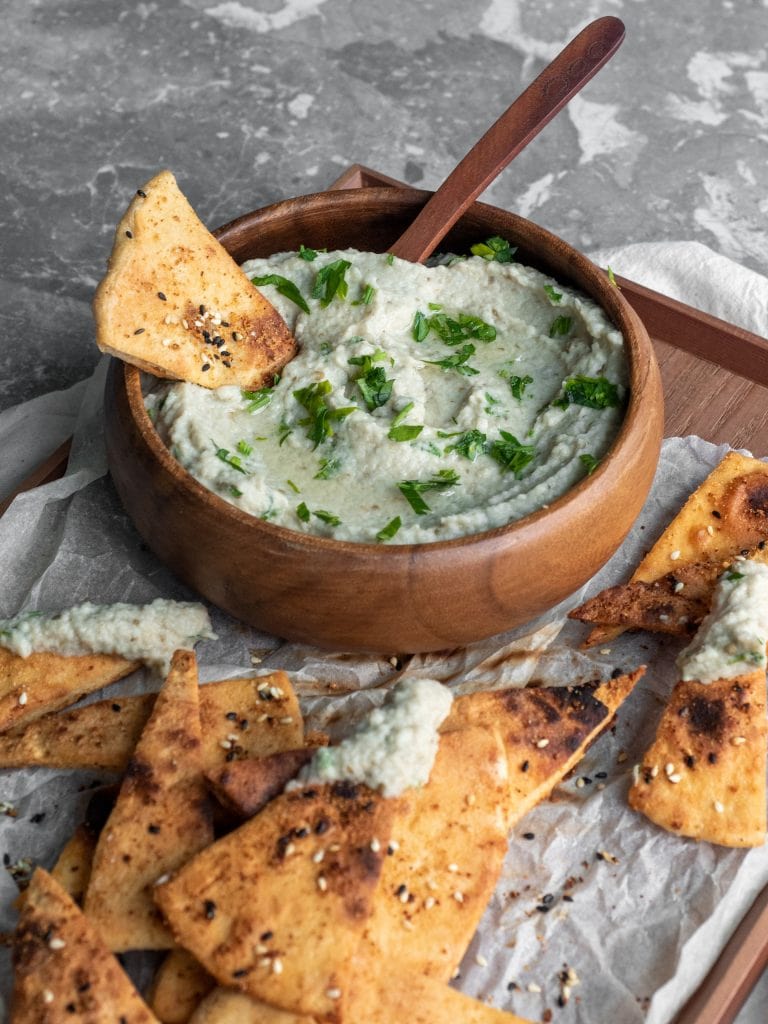
Baba ganoush also offers powerful benefits for those struggling with constipation. The high fiber content of four grams per serving allows you to meet your recommended fiber intake after only a few dips.
Eggplant is also way lower in carbs than chickpeas, making baba ganoush a healthy option when cutting carbs as low as possible.
Greek Yogurt
Our keto Greek yogurt only has two grams of net carbs per container, so you can eat as much as you want. I like sprinkling black pepper, salt, lemon juice and fresh parsley to give it extra flavor.
Black Soybean Hummus
Since black soybeans have fewer carbs than chickpeas, black soybean hummus is another great low-carb alternative to traditional hummus. One serving has three grams of net carbs.
To prepare black soybean hummus, gather the following ingredients:
- A garlic clove
- A 12 oz can of organic soybeans
- Four tablespoons of lemon juice
- Three tablespoons of olive oil
- One and a half tablespoons of tahini
- A teaspoon of salt
- Smoked paprika and olives for garnish
Mix these ingredients in a food processor and add a tablespoon of water at a time until it reaches your desired consistency.
Tahini

Tahini is a middle eastern condiment that tastes like hummus and is made with toasted ground hulled sesame. Although it’s a major ingredient in baba ganoush, it’s yummy when served on its own.
You can make tahini with only three ingredients: sesame seeds, olive oil and salt. Roast your sesame seeds in a pan on high heat, and once it’s nicely toasted, pop it in the food processor with a touch of salt.
After it reaches a powdery consistency, pour a few tablespoons of olive oil at a time until it has the texture of hummus.
Nut Butter
Most nut butters are tasty and low in carbs. The high fat and protein content also helps you catch up on your macros.
My favorite types of nut butter are:
- Peanut butter
- Almond butter
- Sunflower seed butter
But it’s very important to read the label if you opt for store-bought products. Many brands add sugar and other additives to make their nut butters taste better and last longer, but these ingredients can ultimately contribute to devastating consequences to your health.
Instead, shop for all-natural keto brands, or whip up your own at home. It’s super simple. All you need is your favorite keto nuts (my favorite is macadamia nuts), oil, salt and a food processor, and you’re good to go.

Final Thoughts On Eating Hummus On A Ketogenic Diet
Hummus is one of my favorite dips when snacking on keto since it’s mouth-watering and only has around three to four grams of net carbs per serving.
The surprisingly high nutrient density also provides your body with essential nutrients like sodium, potassium, and vitamin E, helping you beat keto flu and improve overall immune function.
And if you’re looking to shake up your low-carb diet, swap your hummus out for keto-friendly alternatives like baba ganoush, Greek yogurt, black soybean hummus, tahini or nut butter.
Searching for more guides on keto friendly foods? Check out our posts on are chickpeas keto?, is rice paper keto?, is quinoa keto?, are lentils keto?, is imitation crab keto?, is peanut butter keto?, is tofu keto? and is mayo keto?
Written by
Matt Gaedke
Matt is a former college basketball player turned computer engineer who discovered his passion for health and nutrition after cutting sugar from his diet in 2016. That year he founded KetoConnect with Megha in order to share their ketogenic lifestyle through recipes, videos, and educational content. Matt is always seeking to grow and try new things, a passion he shares with his wife and two amazing sons.
Expert Fact Checker
Kathryn Bubeck
Kathryn (Katy) Bubeck, RD, LDN is a Registered Dietitian with bachelor’s degrees in nutrition (University of Alabama) and health behavior management (University of Delaware). Originally from the Philadelphia suburbs, Katy has moved up and down the east coast for the past 20 years, and recently relocated to Baltimore, where she plans to eat ALL the seafood!
